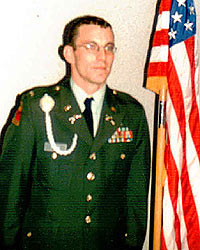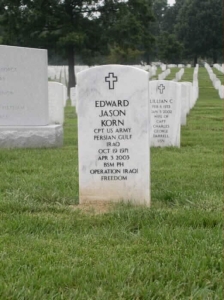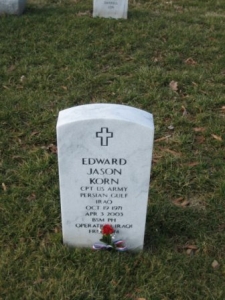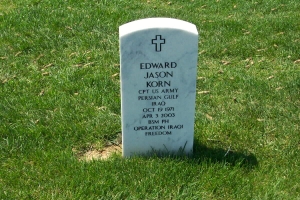Somewhere in Iraq, a U.S. Army major and his unit are tormented by memories of gunning down one of their own after mistaking him for an Iraqi fighter.
Halfway around the world, someone is longing to comfort them — the father of the American soldier they killed.
“I would love to give them a hug,” said Richard Korn, whose only child, Captain Edward J. Korn, died April 3, 2003, in a burst of friendly fire. “I think they need it.
“They didn’t do this on purpose, and we don’t need any more victims. To be bitter would demean my son’s memory.”
Richard Korn, who lives in the tiny Brevard County town of Malabar, buried his 31-year-old son Thursday at Arlington National Cemetery.
Captain Korn, a member of the Army’s 3rd Infantry Division from Fort Stewart, Ga., was killed as his unit and others were attacking Iraqi positions on a two-lane road about 15 miles southeast of Baghdad.
The convoy of American tanks and armored vehicles was stopped on the road when they spotted an Iraqi tank, a Russian-made T-72. They fired and the enemy tank exploded.
As the vehicle burned, Korn and a sergeant apparently dismounted and walked to the tree line near the tank, searching for Iraqi positions, Major Kent Rideout, the senior officer on the scene, told the Los Angeles Times.
At some point, Korn spotted a second tank and sent the sergeant back for an antitank rocket before going on alone.
Korn was wearing a brown T-shirt, a flak vest that was left open and no helmet, according to Rideout, who was scanning the tree line for more Iraqi positions.
“Out of the corner of my eyes, I saw behind the tank what looked to be an old campfire,” Rideout told The Times. “I could see tea or coffee steaming, sleeping bags, chickens. It had all the hallmarks of a place where people were living. I put 2 and 2 together that this was a place a tank crew was living.
“All of a sudden, we saw movement. Someone dropped down, like he was going to fire, and then stood up and got behind another T-72.”
Rideout’s driver also indicated he saw an enemy. He leveled his M-16 and the major ordered him to fire.
“He fired one shot,” Rideout recalled. “I’ll never get over it. It was 200 to 250 yards away. He dropped him. I slapped him [the driver] on the head and said, ‘That’s the greatest shot I’ve ever seen.’ “
The shot had hit Korn, a Desert Storm veteran and Bronze Star recipient who had left Fort Knox, Kentucky, to volunteer for war duty in March.
A Bradley fighting vehicle from Korn’s unit also opened fire on the second Iraqi tank, some of its 25-millimeter rounds striking the fallen soldier.
“This was the worst day of my Army career,” Rideout said. “No doubt, the worst day. I get to go home with that. I get to live with that for the rest of my life.”
Richard Korn and his wife were in Ocala at a dog show when Army officers knocked at his front door less than 10 hours after his son was killed.
“A house guest told them where I was and they drove 150 miles to tell me in person,” he said. “Somebody at the front gate found me and said there was a problem with a motor home. When I saw an armed guard standing out front, I knew what the problem was.”
Friends and family remember Korn as a boy who had triumphed over a troubled childhood.
“He was a hard worker and a good boy who always wanted to help somebody,” said William McIlrath, assistant director of the Bethesda Home for Boys where Edward Korn grew up, arriving there during Christmastime at age 12.
“The thing that really impressed me about him was that he always told the truth, no matter how much it embarrassed him or got him into trouble,” McIlrath recalled Thursday. “Even as a boy, he was a man in that way.”
McIlrath said he wasn’t surprised when Korn enlisted in the Army at 17 and made it a career.
“He liked the discipline,” McIlrath said.
Richard Korn said he derives some comfort in knowing his son died doing what he thought he was destined to do.
“His attitude was, ‘I’m a soldier, there’s a war and that’s where I belong,’ ” his father said.
It troubles him to know others might be blaming themselves for his son’s death.
“I’m trying to get the word out that I am not in the blame game,” he said. “To shoot someone you know, we need to help these people. I can’t help my son now, but I can help those who were there with him.
“I think he would feel the same way.”
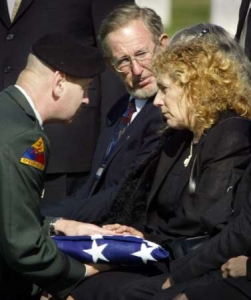
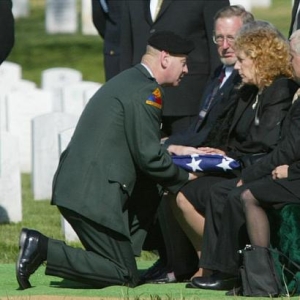
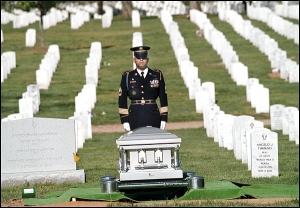
17 April 2003:
Family members and friends gathered to celebrate the life of a soldier killed in action, at Savannah’s Bethesda Home for Boys. Captain Edward Jason Korn was killed in a friendly fire accident two weeks ago. Family members say Korn was shot in Iraq by a unit travelling with him, while investigating an enemy tank.
Korn had called Savannah home since he was seven. It was then that he met his stepmother, Annette Hale. Hale, who help raise him since that time says she’s grateful to have known him. “I’m his ma and he was my son. He’ll always be my son and I’ll always take pride in him. I’m just so proud to have been apart of his life.”
Those who spoke of Korn described him as a “knight” and a “warrior.” To both family and friends he was a respected and fearless individual and soldier. Korn was a tanker in the Army. Friends and family say he loved driving a tank.
Hale says Jason will continue to live through the memories of loved ones. “People don’t die when you continue to talk about them. As long as you can sit around, you can talk about the crazy times and the crazy things and the wonderful and the sad, they never die.”
Korn had served in the military since he was seven. He was stationed at Fort Knox, Kentucky before leaving for Kuwait. Korn will be buried in Arlington National Cemetery next week.
16 April 2003:
Soldier’s funeral held at boy’s home where he grew up
SAVANNAH, Georgia – Edward Jason Korn came to live at the Bethesda Home for Boys in 1984 as a troubled 12-year-old suffering through his father’s second divorce.
The rambunctious youth spent five years attending school and working the farm on Bethesda’s 500-acre campus overlooking the Moon River, and grew up to be an Army captain. He came back for the last time Wednesday, in a flag-draped casket bound for Arlington National Cemetery.
“As an early teen, Jason had some growing up problems, discipline problems,” said the soldier’s father, Dick Korn, who insisted the funeral be held here. “If it wasn’t for this place, he wouldn’t have become the man he was.”
Korn, 31, of Savannah was killed April 3, 2003, in Iraq while inspecting the wreckage of an Iraqi tank. He was shot by U.S. soldiers who mistook him for an Iraqi fighter.
It was a fight Korn could have easily skipped.
After enlisting in the Army straight out of high school, Korn fought as a tank gunner in the first Gulf War, earning a Bronze Star. He returned to the military after college, this time as a commissioned officer.
But Korn refused to stay at Fort Knox, Kentucky, doing paperwork while his fellow soldiers went to war with Iraq. At his request, Korn was assigned to the 64th Armor, 3rd Infantry Division at Fort Stewart in March and deployed for his second war in the region.
“He was focused, a fine young man,” said Bill McIlrath Sr., the Bethesda home’s assistant director who became a mentor to Korn in the 1980s. “He never got married. He said, in his business, he didn’t want to leave any widows or orphans.”
About 90 mourners – family, friends and soldiers in dress uniform – filled the roughhewn pews inside Bethesda’s rustic brick chapel.
Framed photos of Korn, an athletic 6-3, and sprays of red carnations, white daisies and blue violets ringed his casket. He will be buried at Arlington with full military honors next week.
Bethesda, Greek for “House of Mercy,” was founded in 1740 by missionaries alarmed by the homeless children they found in fledgling Savannah. It was the first orphanage established in America.
The placid campus, dotted with towering oaks hung with Spanish moss, remains a refuge for troubled boys – orphans, runaways, abused children and boys with chronic behavior problems.
Korn’s father enrolled him at the home in 1984. He had divorced the boy’s mother when he was 6, and at the time was divorcing his son’s stepmother, with whom the boy had become so close as to call her “Ma.” The 12-year-old Jason – his family called him by his middle name – had begun rebelling to the point where his father opted for outside help.
He adapted well at Bethesda. Korn didn’t care much for school, but loved helping McIlrath with chores on the home’s 150-acre farm.
“We worked one-on-one. He cut a lot of grass with the tractors, helped feed the cows and take care of them when they were sick,” McIlrath said. “You don’t get many children that age who want to work, but he wanted to work.”
In 1989, Korn’s boundless energy took him to another boy’s home, the Paul Anderson Youth Home in nearby Vidalia, founded by the Olympic gold medalist weightlifter. The home’s boot-camp-style discipline suited Korn, and propelled him into the Army.
“Jason had obstacles and adversities through his life to conquer, which he did with help from the Paul Anderson home, Bethesda and his families,” said Don Korn, the soldier’s uncle.
After the funeral Wednesday, Korn’s family reached out to the soldiers involved in his death by friendly fire, wanting them to know the family feels no anger for what it considers a tragic accident.
“I don’t hold them in any blame. I love them and I don’t want their minds to be casualties of this as well,” Korn’s father said. “I’m a Vietnam veteran and I’ve been in some very nasty situations. I probably would have made the same call they made.”
The son of a Malabar, Florida, man has been killed in action in Iraq in a friendly-fire incident.
Captain Edward Korn, 31, of the Army’s 3rd Infantry Division from Fort Stewart, Georgia, was killed April 4, 2003, while examining the wreckage of an Iraqi T-72 tank destroyed by his unit in central Iraq.
Korn’s father, Richard Korn, said his son was killed when somebody on a Bradley infantry fighting vehicle opened fire on the tank, thinking Korn was an Iraqi soldier.
The Army did not return phone calls about Korn. A press release said only that the incident was under investigation.
Korn blamed the incident on a lack of communication and said he felt sorry for the soldier who shot his son.
“Somewhere down the line, somebody dropped the ball. Who knows, it could have been Jason,” he said, calling his son by his middle name as his family has always done. “I consider whoever was operating that Bradley a victim of this, too.”
Edward Korn was a native of Savannah, Georgia, and enlisted in the Army in the late 1980s, his father said. He was a veteran of the first Gulf War. Richard Korn moved to Brevard County in 1987. His son never lived here.
After the Gulf War, Edward Korn left the Army and enrolled at Armstrong Atlantic State University in Savannah, where he majored in political science and was in the Army Reserve Officer Training Corps. After graduating in 1999, he was commissioned as a Second Lieutenant.
Korn had been stationed at Fort Knox, Kentucky, since last July. He was an aide to the base’s commanding officer, Major General Terry Tucker. But when it became evident that the U.S. would soon be at war with Iraq, Korn began looking for an assignment with a combat unit. He ended up with the 64th Armor Regiment, which is attached to the 3rd Infantry Division.
“He was there by his choice, not by assignment,” his father said, adding that some of the people he worked with at Fort Knox tried to talk him out of volunteering. “His attitude was ‘I’m a soldier. This is what I’m trained to do. I’m one of the few combat veterans you have.’ “
His volunteering for combat didn’t surprise his friends at Fort Knox.
“He was the hardest-working guy I’ve ever seen in my entire Army career,” said Captain Nathan Woods. “He wanted to do this more than anything.”
Richard Korn, himself an Army Vietnam veteran, said he had been worried about “friendly fire” casualties in Iraq even before his son was killed. “We’re killing too many of our own people.”
Korn said that when he was a non-commissioned officer with the 1st Cavalry Division in Vietnam, one of his responsibilities was to make sure that all friendly forces in his area knew where all the other friendly forces were. He said that with improved communication equipment, the Army should be doing an even better job of that in Iraq.
“If any good can come out of this, I hope they review their procedures to prevent this from happening again,” Korn said.
He added that he has a lot of sympathy for the soldier who fired on his son, and that he hopes the Army provides him with suitable counseling. “I would say to him ‘You’re OK. I don’t hate you. . . . I love you.’ “
A funeral service is tentatively scheduled to be held in Savannah next Wednesday. Korn will be buried in Arlington National Cemetery after that.
Korn asked that in lieu of flowers that donations be sent to the Bethesda Home for Boys, P.O. Box 13039, Savannah, Georgia, 31416.
KORN, EDWARD JASON
CPT US ARMY
- VETERAN SERVICE DATES: 01/01/1992 – 04/03/2003
- DATE OF BIRTH: 10/19/1971
- DATE OF DEATH: 04/03/2003
- DATE OF INTERMENT: 04/24/2003
- BURIED AT: SECTION 60 SITE 7872
ARLINGTON NATIONAL CEMETERY
Michael Robert Patterson was born in Arlington and is the son of a former officer of the US Army. So it was no wonder that sooner or later his interests drew him to American history and especially to American military history. Many of his articles can be found on renowned portals like the New York Times, Washingtonpost or Wikipedia.
Reviewed by: Michael Howard

